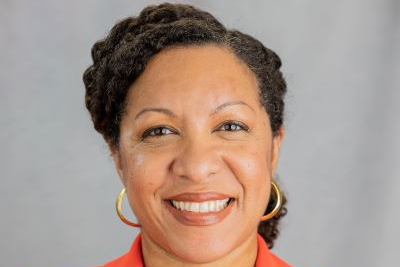It’s rare for today’s business professionals to spend their entire career with the same organization—something that was much more common decades ago. But Keyla Cabret-Lewis has worked with Aflac not only her entire professional career but also even as an intern during her high school years.
Cabret-Lewis started her journey with Aflac as a junior in high school as part of the “Future Business Executive” program at her school in 1995. “That opportunity turned into a college internship,” she explains, “and I continued my career here. I think that, obviously, that’s a unique opportunity, but one that was very fortunate for me and I’ve been able to do this for over 28 years.”
Cabret-Lewis’s first full-time, permanent role with Aflac was as a corporate recruiter in the HR department in 2001. She has since held leadership positions of increasing responsibility in many HR functions, including talent acquisition, university relations, and HR business partners.
At the beginning of her career, Cabret-Lewis felt that recruiting was the area she was really good at, and she loved it. But in 2021, she was asked to take on a diversity, equity, and inclusion (DEI) role, which led to a promotion to business partner—an opportunity to advocate for inclusion more broadly.
Carrying the Torch
Just a few years ago, when we started this series on corporate DEI leaders, it was quite common for them to tell us they were the first person to ever hold their position at their organization. They were starting largely from scratch, perhaps with some primitive DEI groundwork having been done by previous teams.
Today, though, it’s more common for DEI leaders to step into a role previously held by someone else, and that’s particularly true with larger companies that have a more established DEI track record. Stepping into a previous DEI leader’s shoes can mean less flexibility, but it also tends to mean more of a structure is in place with respect to the day-to-day activities of the department, allowing the new leader to focus on more strategic and impactful initiatives.
Cabret-Lewis’s role wasn’t a new position, she says. “We actually have had a diversity officer in the past, but that role’s been mixed with other positions. Chief People Officer Brenda Mullins led the start of our diversity council and our diversity program back in 2010 along with Aflac chair Dan Amos, so we’ve actually had robust diversity efforts since then.” Cabret-Lewis feels she’s extremely fortunate to stand on a very solid foundation and to continue to support the structure and culture that Mullins and Amos created.
Commitment from the Top …
As with many of the DEI leaders we speak with, Cabret-Lewis notes the critical importance of corporate leadership’s support to the success of the organization’s DEI efforts. “It’s a commitment that starts with the top with Dan and most importantly what his actions are.” The rest flows from there, she explains. “We are absolutely a company that loves to celebrate its employees and to help them feel and know that they are appreciated and know that they belong. And so, our programs are really intentionally made to do that.”
That includes making leadership accountability a key part of the broader DEI approach.
“We’ve taken a more strategic approach around the future,” Cabret-Lewis says. This has involved building a strategy that holds leaders accountable to achieve diversity goals—goals that “better reflect our communities and the places where we do business.” Their progress has been impressive.
Today, Cabret-Lewis says, 66% of Aflac’s workforce is female, 49% are people of color, about 50% of all leaders are female. “We’re really proud of what we’ve done. But, of course, we have more to go, obviously,” she says.
… and Input from the Front Line
Of course, leadership being engaged in DEI efforts doesn’t just mean those leaders are taking a top-down approach and ruling by fiat. Instead, companies that take DEI efforts seriously also place great importance on getting feedback from the rest of the organization.
Aflac recognized the importance of building a strong—and diverse—Diversity Council. This, Cabret-Lewis says, “allows us to have people with the common interests of furthering the organization, but they’re all different.” Working on cultural issues together raises awareness and understanding. For instance, “sometimes we have people working on Black History Month, who don’t know anything about Black history—but they get to learn from the Council.”
So many of the DEI leaders we interview for our series stumbled into their roles or came to their organizations relatively late in their careers, but Cabret-Lewis had a much different path. She’s spent her entire career with Aflac’s HR team and even started working with the insurer in high school. The result of that decades-long collaboration is an extraordinarily successful DEI program at a company that’s highly regarded for its commitment to DEI.
Lin Grensing-Pophal is a Contributing Editor at HR Daily Advisor.
The post This DEI Leader Started Her Career in High School appeared first on HR Daily Advisor.
